Do you live in Rosemont? You're now on record opposing bike lanes on Braddock Road
Citizens association vote by fewer than 100 residents raises questions about neighborhood representation
Update, November 21, 2025: The city announced the Braddock Road project will not be on the Traffic and Parking Board’s December 8 agenda. A project update is expected in early 2026.
Do you live in Rosemont? According to the Rosemont Citizens Association, you’re now on record opposing bike lanes on Braddock Road.
Don’t remember voting on that? You’re not alone. Fifty-nine residents attended the association’s Wednesday meeting where the vote took place—representing 1.4% of the neighborhood’s 4,136 residents, according to census data published by the RCA itself.
The organization announced the vote Thursday on Facebook, directing residents to a December 8 Traffic and Parking Board meeting. The characterization has raised questions about whether civic associations can speak for thousands of residents based on decisions by a small group.
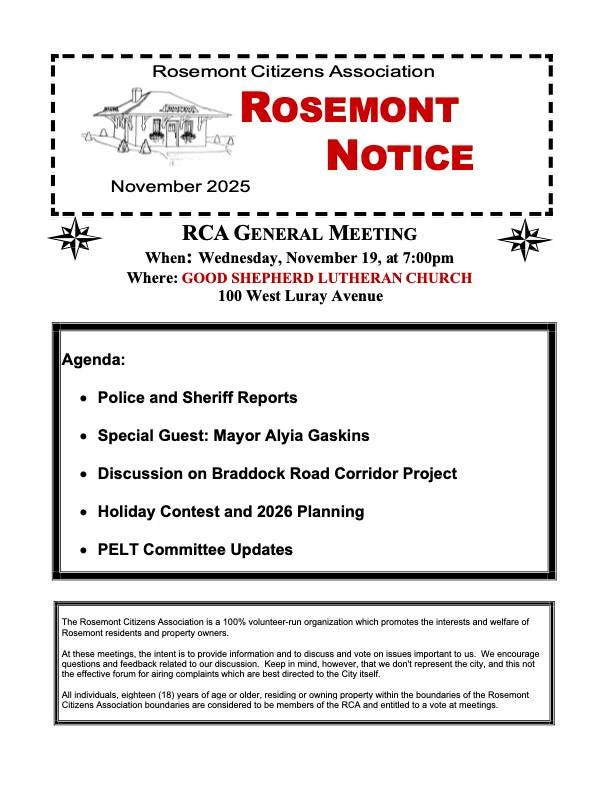
What happened at the meeting
On Wednesday, November 19, the Rosemont Citizens Association held its monthly meeting at Good Shepherd Lutheran Church. The agenda included the city’s Braddock Road Trail Access and Corridor Improvements Project, which would create protected bike lanes along Braddock Road between Russell Road and Commonwealth Avenue.
According to multiple attendees, the evening featured a presentation by a resident opposing parking removal for bike lanes, followed by heated debate between those prioritizing parking and those advocating for protected bike lanes, with some citing child safety concerns.
The debate grew passionate. One parent spoke emotionally, asking how many parking spaces were worth an injured child, according to attendees. Others argued outright opposition was premature and suggested seeking more information from the city.
When the vote came, bike lane supporters were outnumbered. Attendees estimated fewer than 100 people voted against the project. One attendee calculated it represented “less than 4% of the ‘membership’ of RCA who it purported to speak for.”
The motion passed 49 to 10, with 59 people voting total. Opponents of parking removal cited several concerns, including the removal of a handicap-accessible parking space adjacent to Good Shepherd Lutheran Church. The church serves as a community hub, hosting the Alexandria Choral Society, the Symphony Orchestra of Northern Virginia, Encore Senior Chorus, 12-step groups, INOVA blood services, and the RCA itself. Some attendees expressed concern that removing the ADA parking space would make the church inaccessible to mobility-impaired individuals
Some attendees questioned voting procedures, including who was eligible to vote and where exactly Rosemont’s boundaries were drawn.
The representation question
The day after the meeting, the Rosemont Citizens Association posted on Facebook: “On November 19, the Rosemont Citizens Association voted to oppose the removal of parking spaces on Braddock Road between Russell Road and Commonwealth Avenue.”
The announcement made no mention of how many people participated.
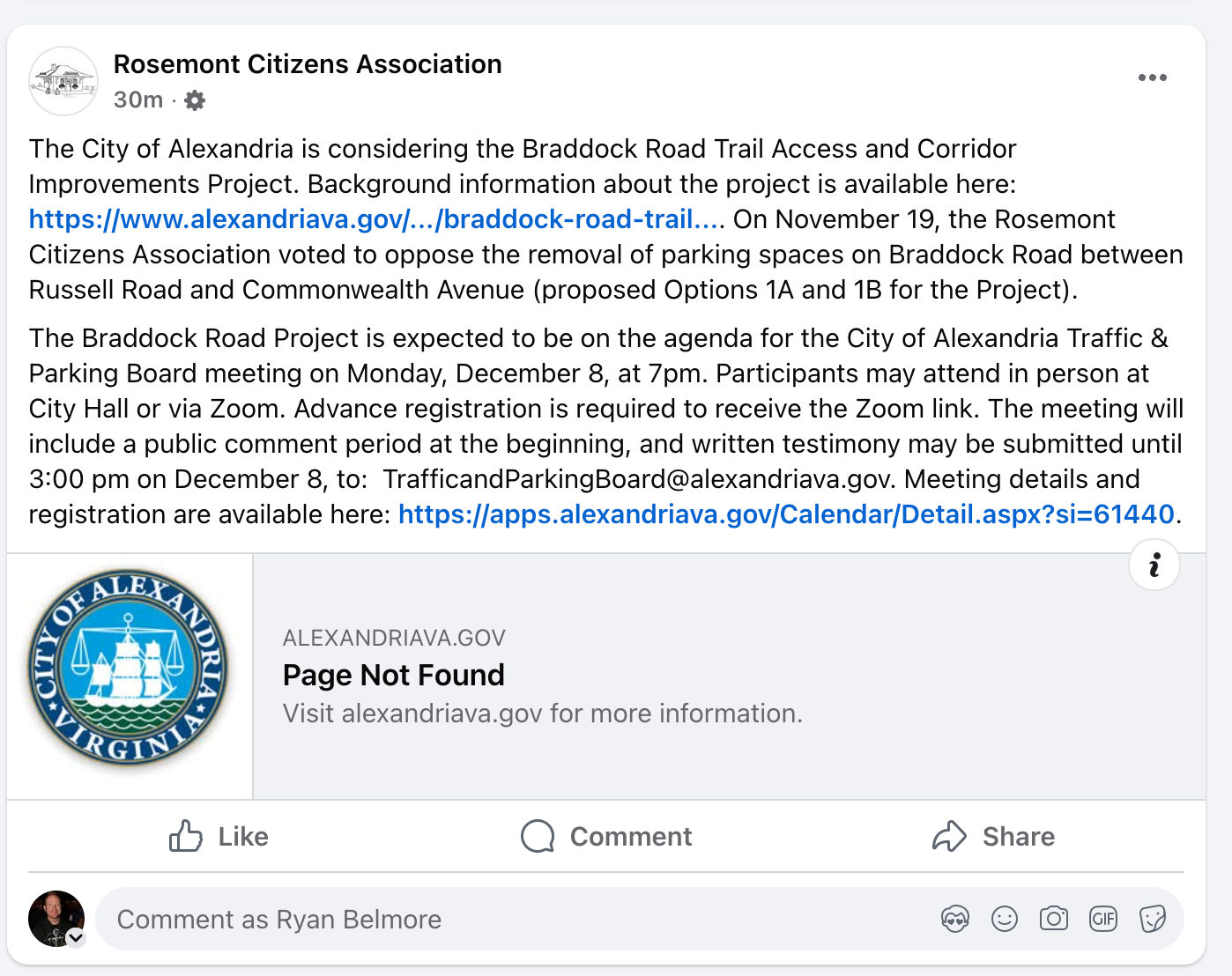
This matters because the RCA’s website states: “Everyone who resides or owns a property in Rosemont is automatically a member.”
Census data from 2023, published by the RCA, shows Rosemont contains 4,136 people in 1,442 households. The 59 voters represent 1.4% of residents
The RCA’s constitution complicates this. While the website claims automatic membership, the constitution requires dues. It’s unclear whether non-paying residents have voting rights.
The RCA constitution requires only 15 members present to constitute a quorum for official votes. Decisions affecting thousands of residents can be made by as few as 15 people who attend.
The Alexandria Brief reached out to RCA President Jol Silversmith asking how the vote would be characterized and whether the organization believes it speaks on behalf of all Rosemont residents. As of publication, Silversmith had not responded.
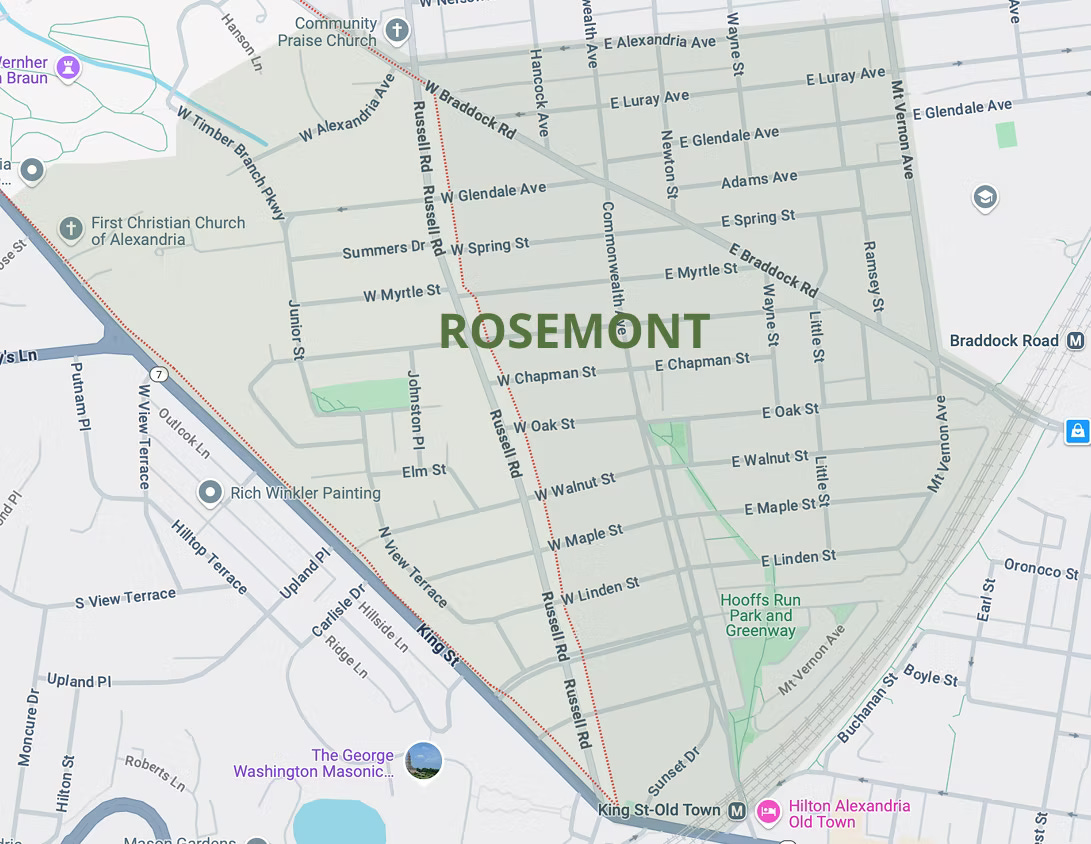
A pattern of inconsistent transparency
The November 19 characterization reflects an inconsistent pattern.
When the association opposed the proposed Monumental sports arena in March 2024, it stated the resolution reflected “the sense of those in attendance.” In October 2023, when endorsing a letter about rail bridge reconstruction, the RCA stated that “meeting attendees endorsed” the action.
But in other instances, the organization has characterized positions as those of “the Rosemont Citizens Association” without specifying attendance. The November 19 bike lanes announcement used this broader language, stating that “the Rosemont Citizens Association voted”—with no mention that the vote represented only meeting attendees.
Historical records show varying characterizations dating back decades.
A meeting attendee disputed the characterization, saying the vote specifically opposed parking removal rather than bike lanes. However, the city’s proposed bike lanes would occupy space currently used for parking, meaning opposing parking removal functionally opposes the bike lane installation
A broader pattern across Alexandria
Wednesday’s meeting reflects broader challenges facing civic associations citywide.
A January 2025 analysis in ALXtra, a newsletter about Alexandria, noted that “attendance at Rosemont Citizens Association meetings generally maxes out at 30 or 40 despite the fact that Rosemont is home to more than 4,000 people.” Wednesday’s meeting drew higher-than-usual attendance with 59 people voting—still less than 2% of the neighborhood.
The newsletter, written by Jesse O’Connell and Becky Hammer, pointed to research showing civic association participants “tend to be disproportionately older, whiter, and more likely to own a home compared to other residents.”
“People with demanding work schedules and those with childcare responsibilities have less time to go to evening meetings, and some face language barriers,” the analysis noted. “As a result, the viewpoints that get elevated through these groups tend to focus on the concerns of a narrow segment of residents which are then characterized as what ‘the neighborhood’ wants.”
Census data published by the RCA shows demographic factors that may affect attendance. About 32% of Rosemont residents are under 30 years old—an age group that research suggests is less likely to attend evening meetings. Additionally, 35% of residents drive alone to work, 9% carpool, and 15% use public transportation. About 46% of residents moved to Rosemont in 2015 or later, meaning nearly half the neighborhood may be less connected to established civic association networks.
Alexandria gives civic associations special standing in policy debates. Association representatives can speak for five minutes at public hearings, compared to three minutes for individuals, under the rationale that they speak for all neighborhood residents. Civic associations also have reserved seats on some city commissions.
“While we should absolutely appreciate with gratitude the efforts of our civic association leaders to connect us with our neighbors and keep us informed,” the ALXtra analysis concluded, “we need to critically examine the practice of allowing their comments to carry extra weight in public policy debates.”
The safety project at stake
The Braddock Road Trail Access and Corridor Improvements Project aims to enhance safety and accessibility along Braddock Road between Russell Road and North West Street, creating better connections for walking, biking, transit, and driving while improving access to the Braddock Road Metrorail Station, Potomac Yard Trail, and Metro Linear Trail.
The corridor has been identified as a safety priority by multiple entities. The Virginia Department of Transportation designated the section between Mount Vernon Avenue and North West Street as a top priority for pedestrian and bicycle safety upgrades statewide. A 2023 Safe Routes to School Walk Audit at George Washington Middle School recommended safety improvements. Residents have reported safety issues through the city’s Alex311 system.
The city’s project webpage notes: “The corridor’s mixed traffic creates safety concerns, particularly during rush hour and at crossings, where different types of travelers interact.”
The city conducted community outreach from March through October 2025, collecting feedback on design options. An open house on September 17 at George Washington Middle School drew nearly 40 residents.
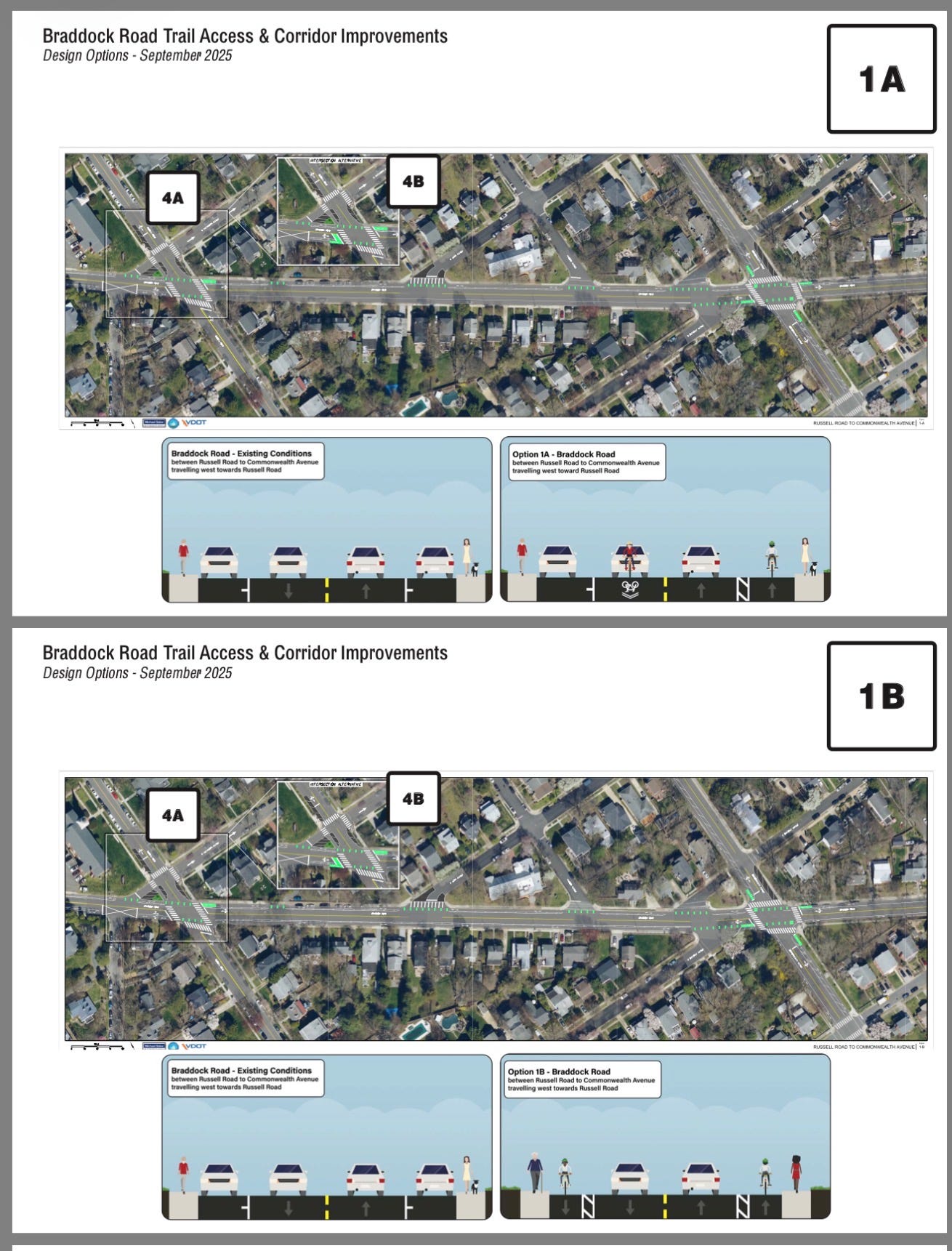
The project presents competing accessibility concerns. Opponents note that removing the ADA parking space at Good Shepherd Lutheran Church would impact mobility-impaired residents who drive to the community hub. Supporters point to the current corridor’s safety hazards for people who walk or bike, including children traveling to George Washington Middle School, which prompted the Safe Routes to School recommendations.
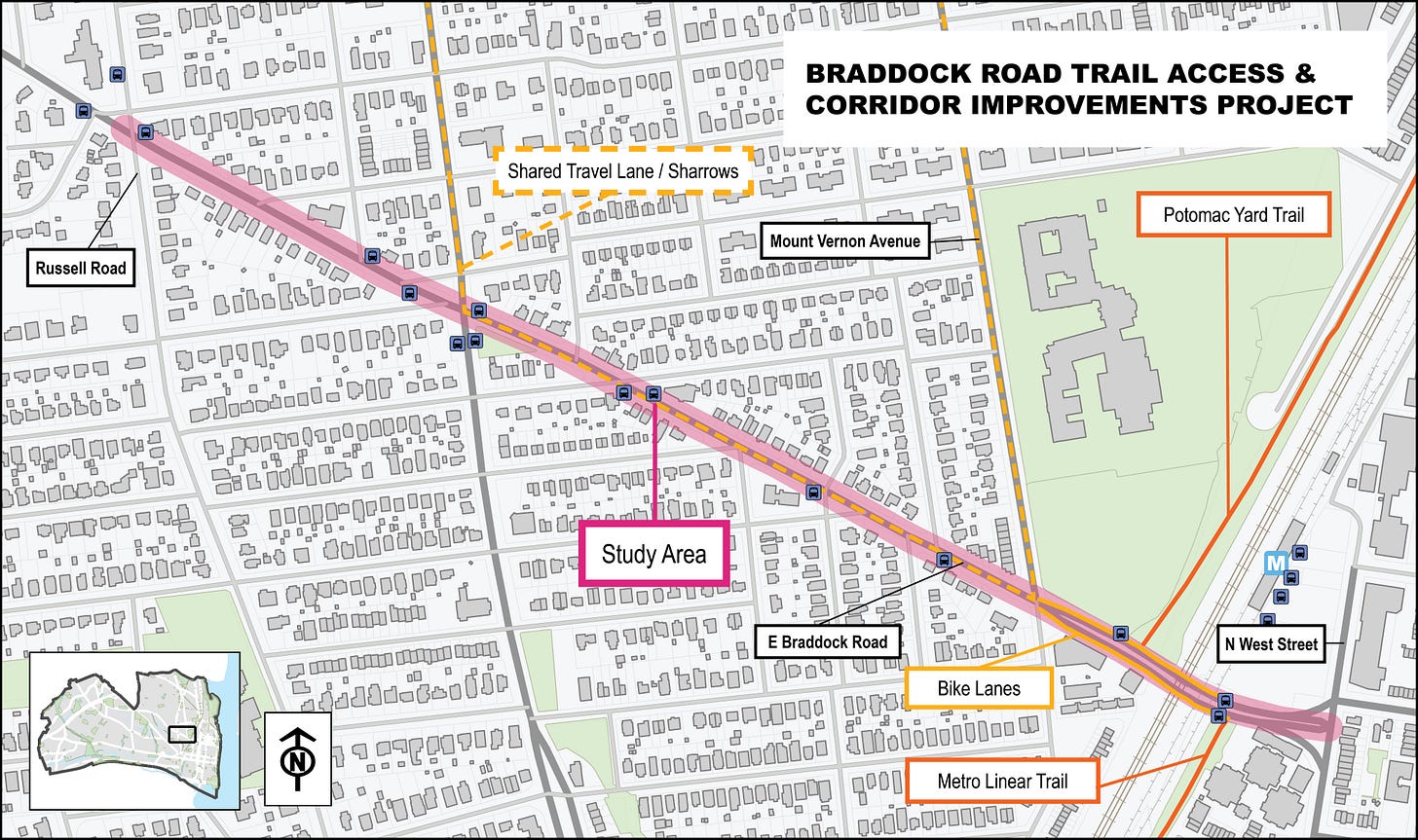
What this means for city decision-making
The RCA’s Facebook announcement directed residents to the Traffic and Parking Board meeting on Monday, December 8, at 7 p.m., where the Braddock Road project is expected to be discussed.
When the board hears that “the Rosemont Citizens Association opposes this project,” members may not know the position is based on a meeting where 59 people voted—1.4% of the neighborhood’s 4,136 residents
The question of how much weight city officials should give civic association votes has become increasingly relevant as Alexandria addresses transportation and land use decisions affecting safety, climate, and equity.
When an organization claims all neighborhood residents as automatic members but only a small fraction participates in decisions, questions arise about representation and whose voices are heard in city policy debates.
“Even if civic associations were perfectly representative of the population, there would still be disagreements among their members,” the ALXtra analysis noted. “Yet if there’s a vote or a poll on an issue, even a close one, the winning position is stated as the position of the membership as a whole. All of this can create the impression that certain views are more widely shared than they actually are.”
How residents can weigh in
Update, November 21: The city announced the Braddock Road project will not be on the Traffic and Parking Board’s December 8 agenda. The city says it will share another project update in early 2026.
Rosemont residents who disagree with the RCA’s stated position—or who weren’t aware a vote took place—have multiple ways to make their voices heard.
The Traffic and Parking Board will hold its meeting on Monday, December 8, at 7 p.m. in the City Hall Council Chambers (301 King Street, second floor). The meeting will also be accessible virtually via Zoom by registering on the city’s calendar page.
There will be a public comment period at the beginning of the meeting. Residents can also submit written testimony until 3 p.m. on December 8 to TrafficandParkingBoard@alexandriava.gov.
Both options are available to all Alexandria residents, regardless of civic association membership or attendance at meetings. The city says that it considers all public input in its decision-making process.
Information about the Braddock Road project, including design options and previous community feedback, is available here.
The Alexandria Brief reached out to the Rosemont Citizens Association and city officials for comment. This article will be updated if responses are received.
Update, November 21, 2024: This story has been updated to include the specific vote count (49-10, 59 total voters) and information about concerns regarding a handicap-accessible parking space at Good Shepherd Lutheran Church. This information was provided after publication by a meeting attendee
About the Rosemont Citizens Association
The Rosemont Citizens Association describes itself as “a 100% volunteer-run organization working to promote the interests and welfare of its members.” It is a 501(c)(4) nonprofit organization.
Leadership:
President: Jol Silversmith
1st Vice President: Jordan Eccles
2nd Vice President: Rosemarie Spano
Treasurer: Dina-Maria Deringer
Secretary: John Patrick
Population (per 2023 Census): 4,136 residents in 1,442 households
Membership: According to the RCA website, “Everyone who resides or owns a property in Rosemont is automatically a member.” The RCA constitution states members must pay dues set by the Board of Directors.
Voting Requirements: The RCA constitution requires only 15 members present to constitute a quorum for official votes. The constitution also allows non-members to vote on land use issues “at the discretion of the elected officers.”
Meetings: The RCA holds regular meetings on the third Thursday of each month at Good Shepherd Lutheran Church.


The Rosemont Citizens Association voted to oppose removing parking spaces on Braddock Road between Russell Road and Commonwealth Avenue. They did NOT vote to oppose bike lanes.
Speakers repeatedly affirmed their support for safe, efficient, and accessible streets for all users—drivers, cyclists, pedestrians, and transit riders. They also emphasized that Rosemont’s strength lies in how neighbors care for and support one another, even when they disagree.
The motion presented to the Rosemont Citizens Association for consideration and vote focused on removing parking on this short stretch of Braddock Road, including the only handicap-accessible parking space adjacent to Good Shepherd Lutheran Church. Eliminating that space would make the church inaccessible to people with mobility impairments—the very individuals the Americans with Disabilities Act is designed to protect.
Good Shepherd is more than a place of worship; it is a community hub used by the Alexandria Choral Society, the Symphony Orchestra of Northern Virginia, Encore Senior Chorus, 12-step groups, INOVA blood services, and the Rosemont Citizens Association itself. Several of these organizations have stated they could no longer meet there without nearby parking, threatening one of the neighborhood’s key gathering spaces.
These concerns are not anti-bike. They are pro-accessibility, pro-safety, and pro-community. One can support safe, efficient streets for all users while also believing that adding bike lanes at the expense of essential parking on this segment of Braddock Road is not the right solution. The Rosemont Citizens Association’s position reflects legitimate concerns and asks the City to pursue safety improvements that do not shut residents out of their homes or community institutions.
The conversation about the Braddock Road Trail Access and Corridor Improvement Project should continue, but it must do so with accuracy and respect, not division and misinformation.